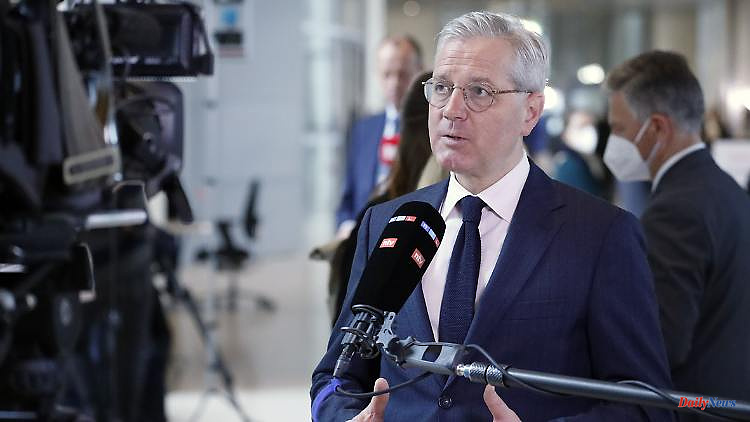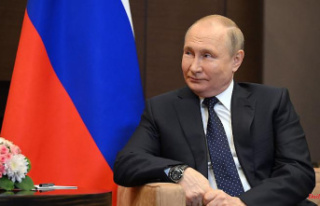CDU foreign affairs expert Röttgen analyzes the dramatic situation in the conflict with Russia in 190 pages. He must also name mistakes of his own party. Now things are to be done quickly and pragmatically - with an oil embargo and associated EU membership for Ukraine.
The oil embargo must come much faster. This is one of the conclusions that Norbert Röttgen, CDU foreign policy expert and failed candidate for party chairmanship, draws from an analysis of Germany's Russia policy in recent years. The war will be decided by the stamina of the two opponents and "on the Russian side, stamina is above all a question of economic stamina," said Röttgen at the presentation of his book "Never Again Helpless!" in Berlin.
True, Russia's exports are lower than before the war began, "but war fuels speculation and leads to high prices," says Röttgen. That's why the foreign currency that flows into Vladimir Putin's coffers every day is extremely high. "This stabilizes the Putin system, from the currency to the economy." The oil embargo was therefore too late towards the end of the year, it had to "come much sooner".
In the 190-page "Manifesto in Times of War", written and printed within a few weeks, Röttgen pleads for a change in policy - for more resilience, i.e. resistance to threats. He calls for a new approach to the challenges of this time and names Russia, China, energy security, climate change.
Röttgen wants to shift priorities. However, since the old priorities have largely been set by his own party over the past 16 years, he cannot avoid naming mistakes in Union policy again and again in his analysis. As "desire instead of reality" he summarizes some of them. Because, according to Röttgen, everyone could see that Gazprom's storage facilities were empty. "Those who made the decision" said it was even clearer than others that Russia not only bought the oil, but also the processing, the refinery. The dependence on Putin was obvious, says Röttgen.
Accordingly, in retrospect, he sees the mistake that "one" always acted as if Putin was "actually one of us" and "we would never start a war." The Russian ruler had been belittled. Methodologically, Germany simply did not get involved with the others and acted as if everyone was only equipped with a Western perspective. "We don't respect that there is also a completely different view of the world."
In view of this different view of the world, which Röttgen ascribes not only to Russia but also to China, the Union politician is now calling for a new foreign policy - faster action with a willingness to take risks. The EU oil embargo, which Hungary's head of state Viktor Orbán openly rejects, must come without Hungary if necessary. From the point of view of the foreign politician, the European states would have to break away from the unanimity that is required in the EU for such decisions. "We're saying goodbye to 28 because they won't get together anyway." Instead, the EU states should form a group that is ready for the embargo. "Then we use resources that are necessary if we really want to pursue our interests."
For Röttgen, the wrangling over Ukraine's possible accession to the EU is neither purposeful nor pragmatic enough. "We need quick solutions that are feasible" - from his point of view, this is what is known as "associated membership" in the European alliance, which could include participation in EU summits, for example. Italy's Prime Minister Mario Draghi had already made such a proposal.
"The focus should be on the economic association," writes Röttgen in the book, "which should gradually lead to integration into the domestic market." Röttgen omits the difficult question of whether the EU assistance clause, which obliges EU partners to provide military assistance in the event of an attack, would also apply to such an associated member.
Röttgen also clearly names another foreign policy mistake that he blames on former US President George W. Bush. During his tenure, he was instrumental in ensuring that Ukraine did not receive the status of a candidate country from NATO, but rather the promise to become a member. As is well known, nothing came of it, "but at the same time, of course, it was signaled to Putin: They are on the way there." From the point of view of the CDU man, it was "the worst thing you could do in the end".
In his book and in the presentation, Röttgen does not provide a detailed analysis of foreign policy in recent years. What the manifesto does, however, is: to summarize the current situation in its essential aspects, to draw conclusions from the current developments and to raise some of them to concrete demands. Röttgen's "Manifesto" can provide an impetus for the necessary debate about how Germany will pursue its own interests in the near future and, as the fourth-largest economic power, also want to play a more active role in shaping world politics.












